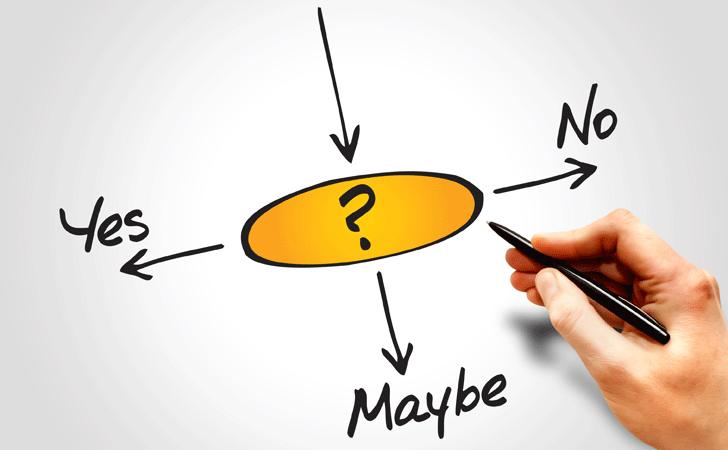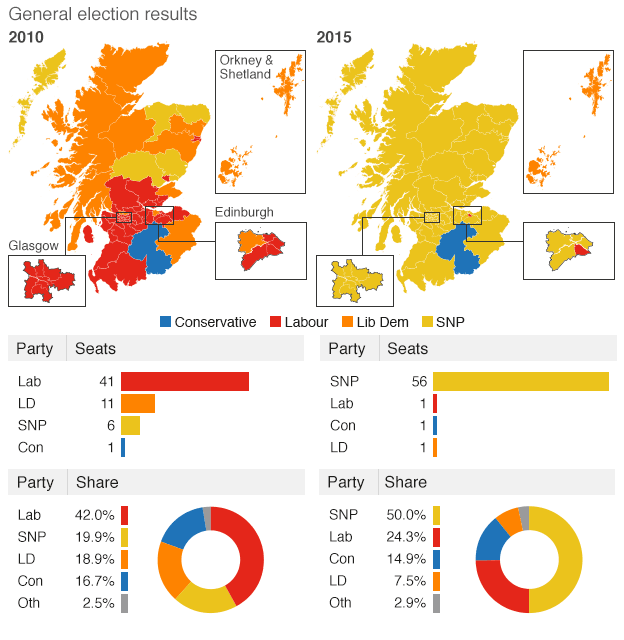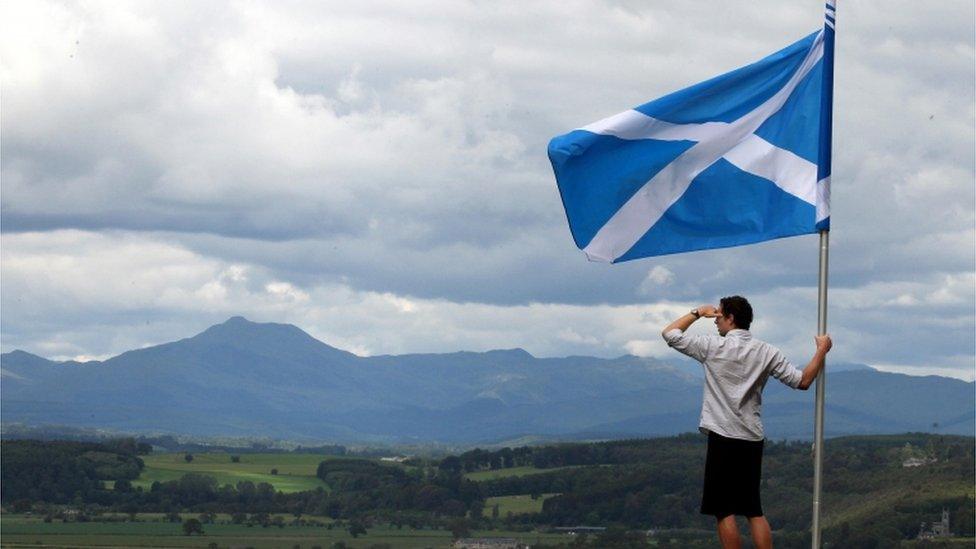What are the latest polls saying about Scottish independence?
- Published

A year ago Scotland voted "No" to independence by 55% to 45%.
It looked as though what the Scottish National Party itself had said was a "once in a generation" event had indeed delivered the "decisive" verdict for which the UK government at least had been hoping.
Scotland was, it seemed, firmly set to remain in the Union.
But a year on the referendum does not look to have been so "decisive" after all.
The country remains more or less evenly divided on whether it should become independent or not.
There is much discussion that there might be a second bite of the referendum cherry. Meanwhile, defeated but unbowed, the pro-independence SNP has come to dominate the nation's political landscape.
Polling on Scottish independence
25
Polls since September 2014
-
17 - Putting 'No' ahead
-
7 - Putting 'Yes' ahead
-
1 - Equal split for 'Yes' and 'No'
During the course of the last year, no less than 25 polls have asked people how they would vote in a second referendum.
While most, 17, have put "No" ahead, seven have suggested that a majority would vote "Yes" (while one showed a tie).
Nearly all of them have put the two sides close to each other. On average, these polls have (after leaving aside Don't Knows) put support for Yes at 48%, and for No, 52%.
Most voters (over 90%) say they would vote the same way now as they did a year ago.
Move to 'Yes'
However, most polls have also found that slightly more people say they have switched from "No" to "Yes" than vice-versa. That is why the "No" lead now looks to be somewhat narrower.
This mood is not a recent one. It was in evidence as soon as the referendum was over.
There was much media excitement earlier this month when a couple of polls put "Yes" ahead. It was forgotten that "Yes" had also been ahead in three of the five polls that were conducted between referendum polling day and last Christmas.
As it happens, three other polls released last weekend put "No" narrowly ahead. If, as it seems, Scotland is now more or less evenly divided on the issue the random variation to which polls are subject will ensure that some polls will put "Yes" ahead, others "No".
But while the balance of public opinion on independence may have shifted only a little since last September, the Scottish political landscape has been transformed.

How has Scotland's political map changed?

The SNP won 56 seats, the Tories, Lib Dems and Labour won just one each. That saw Scotland's political map changed from a distinctive red/orange to a widespread yellow.

The SNP, hitherto largely bit players in elections to the UK House of Commons, won 50% of the vote and 56 of Scotland's 59 seats in May's UK general election. Scottish Labour's tally fell from 41 MPs to just one as the party suffered its worst result since 1918.
Meanwhile, polls of how people anticipate voting in the Scottish Parliament election due to be held next year suggest that, despite proportional representation, the SNP is heading for a second overall majority. The most recent polls have put SNP support on average on 54%, with Labour trailing on just 22%.
The reason for this SNP success is simple. Having backed independence last September, those who voted "Yes" - who included one in three of those who voted Labour in 2010 - now wish to affirm their choice by voting SNP, thereby giving the party a firm foundation of support that none of their opponents can match.
According to the British Election Study, no less than 90% of those who voted Yes a year ago went on to back the SNP last May. That pattern, together with some success in picking up "No" voters, was enough to take the SNP to the 50% mark.
Holyrood majority
In a referendum such a performance would leave the outcome on a knife-edge. But in a parliamentary election against a divided opposition it was more than enough to secure a landslide.
Equally, the most recent polls suggest that next May the SNP will again pick up the support of 90% of those who voted "Yes" in the referendum, support that could then be topped up with the backing of one in six who voted "No".
The prospect of a second SNP majority at Holyrood, together with the continued high levels of support for independence in the polls, has inevitably fuelled speculation about whether the SNP would use another term in office to try to hold a second independence referendum.
Voters' attitudes to that prospect largely reflect their views about independence. Nearly everyone who wants Scotland to remain in the Union opposes the idea of an early second referendum. Many of those who back independence would like one to be held soon.
Some 85% or so of "No" voters oppose a referendum being held within the next five years while much the same proportion believe the SNP should not promise a referendum in their election manifesto next year.

Is a second referendum on the horizon? Polling suggests views on independence are evenly split
In contrast around three-quarters of "Yes" supporters would like a ballot to be held within five years, although only 56% believe the SNP should promise a referendum.
The apparent hesitancy about holding a referendum amongst some "Yes" supporters is perhaps a recognition that, at present at least, it is still far from clear that a second ballot would be won by the pro-independence side.
Of course, there is still a long way to go to next year's Scottish election and the possibility of a second SNP majority.
New Labour leadership
Labour have recently elected both a new Scottish leader, Kezia Dugdale, and a new UK leader, Jeremy Corbyn, who have yet to stamp their mark on the party. Perhaps they can begin to erode the SNP's lead?
Certainly, data from the British Election Study show that those who have switched from Labour to the SNP in the wake of the referendum are typically more left-wing and keener on greater equality than are those who have remained loyal to the party.
So if Mr Corbyn does succeed in moving his party to the left, perhaps some of those voters will be attracted back to the fold?
However, he may also find that for the time being at least they are too committed to independence to think about going back to Labour. Scotland's constitutional future may now rest on which possibility proves to be right.
John Curtice is Professor of Politics at Strathclyde University and Chief Commentator at whatscotlandthinks.org, external.